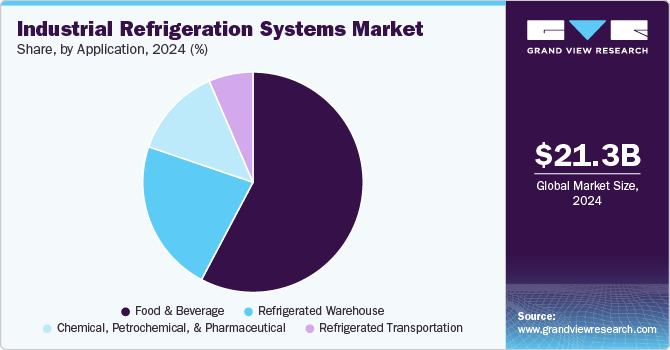Industrial Refrigeration Systems Market Long-Term Outlook: Global Trends and Segment Forecasts
The industrial refrigeration systems market is entering a transformative phase driven by digitalization, sustainability, and technological innovation.
The global industrial refrigeration systems market size was estimated at USD 21.32 billion in 2024 and is projected to reach USD 28.11 billion by 2030, expanding at a CAGR of 4.8% from 2025 to 2030. The market’s robust growth is primarily driven by the rising demand for cold storage solutions across the food & beverage, pharmaceutical, and chemical industries.
The need for efficient storage and transportation of perishable goods continues to accelerate due to the expansion of global food supply chains. Stringent regulations related to food safety and energy efficiency are further encouraging industries to adopt advanced refrigeration technologies. Additionally, the integration of IoT and automation in refrigeration systems enhances operational performance through energy efficiency, real-time monitoring, and predictive maintenance, leading to reduced operational costs.

The industry is also witnessing a growing shift toward natural refrigerants such as CO₂ and ammonia, driven by increasing environmental awareness and stricter sustainability mandates. Meanwhile, the rise of e-commerce and online grocery delivery services is fueling the need for large-scale refrigerated warehouses. As industrial sectors embrace sustainability, digitalization, and energy optimization, the demand for modern industrial refrigeration systems is set to grow consistently through the decade.
Technology Evolution and Sustainability Trends
The industrial refrigeration sector is rapidly integrating IoT-enabled technologies and smart monitoring solutions to maximize efficiency. Modern systems now feature AI-powered analytics, real-time temperature tracking, and cloud-based data insights, allowing businesses to optimize performance, reduce downtime, and cut energy consumption. These capabilities are proving especially transformative for cold storage facilities, food processing plants, and logistics operators, making IoT-driven refrigeration systems a standard across industrial operations.
With rising energy costs and stricter environmental policies, industries are investing in energy-efficient refrigeration solutions featuring variable speed compressors, thermal energy storage, and advanced insulation technologies. Moreover, government incentives and corporate sustainability targets are accelerating the shift toward eco-friendly and low-GWP systems. The food and beverage industry, in particular, is modernizing its infrastructure to align with carbon reduction goals.
Key Market Trends & Insights
- Asia Pacific led the market with a 32.62% revenue share in 2024.
- By component: The compressors segment held a significant market share of ~23% in 2024.
- By capacity: The 500kW–1000kW segment accounted for the highest share in 2024.
- By refrigerant: The HCFC segment captured the largest market share in 2024.
- By application: The food & beverage sector dominated the market in 2024.
Download a free sample PDF of the Industrial Refrigeration Systems Market Intelligence Study by Grand View Research.
Market Size & Forecast
- 2024 Market Size: USD 21.32 Billion
- 2030 Projected Market Size: USD 28.11 Billion
- CAGR (2025–2030): 4.8%
- Leading Region (2024): Asia Pacific
Competitive Landscape
The global industrial refrigeration systems market features established players and emerging innovators, each driving advancements through strategic investments, R&D, and digital integration.
- Johnson Controls is a global leader in commercial and industrial refrigeration, offering advanced cooling systems for data centers, healthcare, and retail industries. The company invests heavily in IoT-enabled predictive maintenance and low-GWP refrigerant technologies to align with sustainability standards. Its strong global footprint and acquisitions enhance its competitive position.
- Emerson Electric Co. dominates the refrigeration landscape with its Copeland-branded compressors and automation technologies. Focused on AI and IoT integration, Emerson aims to optimize efficiency and lower operational costs while leading innovation in CO₂ and low-GWP refrigerant systems.
Emerging players are also reshaping the competitive environment:
- EVAPCO Inc. is expanding rapidly with its energy-efficient evaporative and hybrid cooling technologies for industrial applications. The company emphasizes natural refrigerants and advanced heat transfer solutions to meet growing sustainability demands.
- Güntner GmbH & Co. KG specializes in high-performance heat exchangers and is investing in digitalization and CO₂/ammonia-based cooling systems to enhance environmental compliance and energy performance.
Prominent Companies Include
- Johnson Controls
- Emerson Electric Co.
- Danfoss
- GEA Group Aktiengesellschaft
- MAYEKAWA MFG Co. Ltd.
- BITZER Kuhlmaschinenbau GmbH
- DAIKIN Industries Ltd.
- EVAPCO Inc.
- Güntner GmbH & Co. KG
- LU-VE S.p.A
Explore Horizon Databook – the world’s most comprehensive market intelligence platform by Grand View Research.
Conclusion
The industrial refrigeration systems market is entering a transformative phase driven by digitalization, sustainability, and technological innovation. As industries prioritize energy efficiency and environmental compliance, the adoption of IoT-driven, low-GWP, and high-performance cooling systems will continue to accelerate. With strong growth potential across the food & beverage, pharmaceuticals, and logistics sectors, the market is poised for steady expansion through 2030.